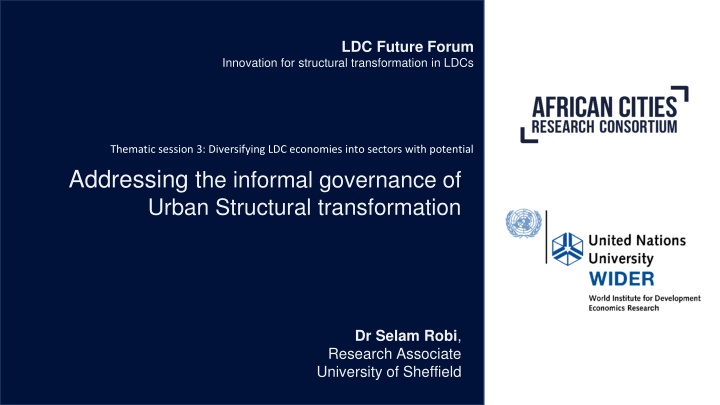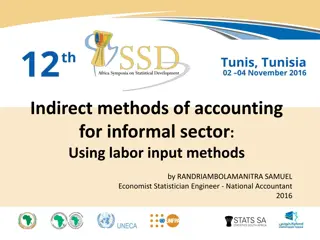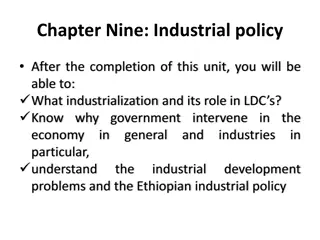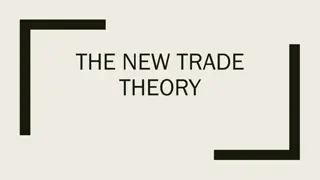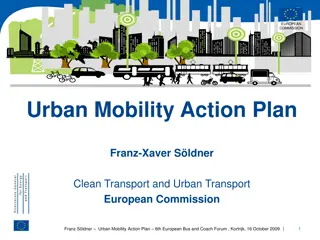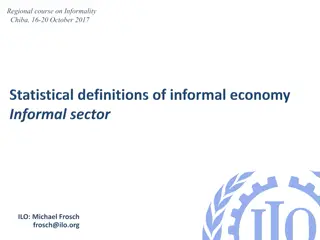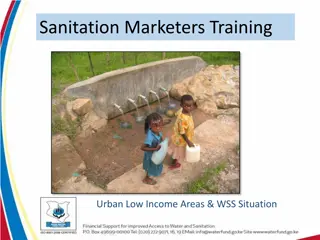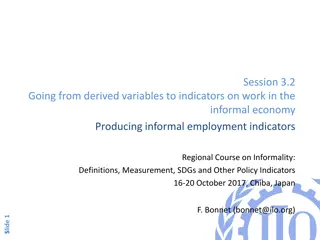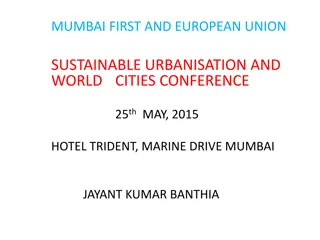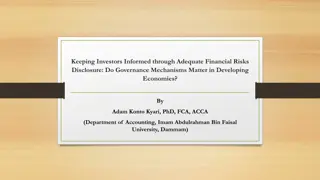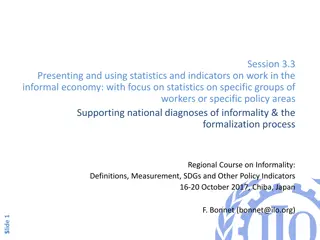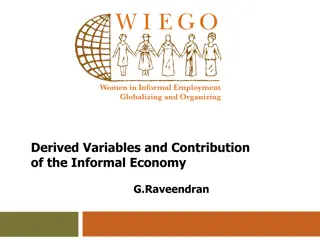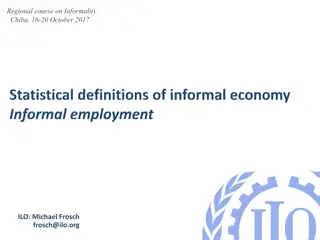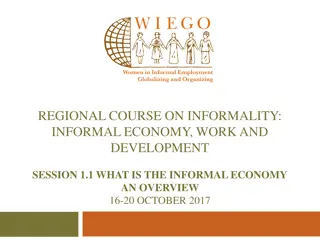Diversifying LDC Economies and Informal Urban Governance
Urban structural transformation, focusing on expanding LDC economies and addressing informal governance in rapidly evolving African cities, is crucial for unlocking national economic growth. The need to shift towards higher value-added activities, enhance productivity, and create better job opportunities is highlighted. Understanding the dynamics of informal deals, politics, and governance in urban sectors is emphasized to overcome barriers to equitable economic evolution. The significance of political settlements and power configurations in shaping informal arrangements for different firms is explored within the urban development framework.
Download Presentation

Please find below an Image/Link to download the presentation.
The content on the website is provided AS IS for your information and personal use only. It may not be sold, licensed, or shared on other websites without obtaining consent from the author.If you encounter any issues during the download, it is possible that the publisher has removed the file from their server.
You are allowed to download the files provided on this website for personal or commercial use, subject to the condition that they are used lawfully. All files are the property of their respective owners.
The content on the website is provided AS IS for your information and personal use only. It may not be sold, licensed, or shared on other websites without obtaining consent from the author.
E N D
Presentation Transcript
LDC Future Forum Innovation for structural transformation in LDCs Thematic session 3: Diversifying LDC economies into sectors with potential Addressing the informal governance of Urban Structural transformation Dr Selam Robi, Research Associate University of Sheffield
An Urban Structural Transformation Agenda? What type of urban economic structural change is needed for cities to unlock national Structural Transformation? The growth and graduation of urban enterprises into higher value adding and more productive firms African cities are increasingly seen as key to unlocking national structural transformation and inclusive growth because they: host the fastest growing pool of low- productivity bound, low value adding and informal labour force and small firms that channel investment towards the creation of more, better paying jobs amidst hostile business and political environments prevalent in cities attract investment in non-productive sectors (e.g: real estate) the lion s share of domestic Traditional associated with National ST agendas don t directly translate to the urban scale. sectoral transformation that is
The Informal Governance of Urban ST How do informal deals and politics shape prospects for growth and equitable urban economic structural change in rapidly growing African cities? Firms do business in deals environments where informal arrangements are firm specific and therefore variegated (Kar et. al., 2022). African urban structural change processes take place within business environments dominated by various forms of political informality (Stark, 2008; Mitlin, 2014; Goodfellow, 2020) A better understanding of the informal governance of various sectors of the urban economy is needed for addressing key barriers to equitable urban economic structural change. In this context, formal blanket rules reforms do not address barriers within uneven business environment playing fields and urban industrial policy may require preferential and targeted action (e.g. for new entrants and industries) (Driemeier and Pritchett, 2015). Barriers created by differential access and durability of informal arrangments can affect the growth, productivity and value addition outcomes of urban enterprises. Anti-competitive state business relations can disincentivize the channelling of investment towards productive sectors in cities.
Deals and Development Framework POLITICAL SETTLEMENTS: what are the implications of the configuration of power between a city s contending groups for the types of informal arrangements available to different firms ?
Deals and Development Framework RENTS SPACE: how do different business segments and sub-segments in the city relate to and benefit from the prevailing political settlement at city and national level? Profit from being competitive Profit from relationships with politicians Rentiers natural resource firms exporting to world commodity markets. Magicians exporters that operate in competitive industries. They are labelled magicians since they make a market out of nothing (as opposed to firms serving the domestic population that can rely on a captive market). oriented Export Domestic market Powerbrokers firms catering to the domestic sector that operate in industries subject to regulatory rents (profits derived from some discretionary or deliberate action of government) Workhorses firms operating in competitive markets that serve the domestic economy. oriented
Deals and Development Framework DEALS SPACE - what types of informal and personalized relationships are observed between economic and political actors at the city level? Whether deals are widely available or limited to the elite Whether deals, once negotiated are honoured Open - deals depend on actions of agents but not identities) Closed -deals are available only to specific individuals/organizations Ordered- once negotiated, deals will be honored) Anyone can make a deal, and they can be certain that officials will deliver Only those with political connections get to make deals, but they can be confident that officials will deliver Only those with political connections get to make deals, and even they cannot be certain that officials will deliver Disordered- deals will be honored so long as they are in the short-term interests of political elite Anyone can make a deal, but no one is certain that officials will deliver
Deals and Development Framework Structural transformation - what risks and opportunities do different types of deals spaces create for prospects of structural transformation Negative Implications Risk of Oligopoly: A highly ordered but open space might lead to the formation of oligopolies, reducing the diversity of market players and potentially limiting choices for consumers. Entrance Barriers: Strict order in an open space could inadvertently create barriers for new entrants, restricting the flow of fresh ideas and perspectives. Positive Implications Competition and Innovation: An open but ordered space encourages healthy competition, driving innovation and efficiency, which can positively impact structural transformation. Efficient Resource Allocation: An ordered environment allows for efficient allocation of resources, enhancing the prospects of successful structural transformations. Negative Implications: Limited Innovation:Overly closed spaces might limit exposure to innovative ideas, hindering the introduction of new technologies or methods that could contribute to structural transformation. Monopolistic Tendencies: A closed and ordered space could potentially lead to monopolistic tendencies, limiting competition and stifling organic growth. Positive Implications Stability: A closed and ordered deals space can provide stability and predictability, creating a conducive environment for long-term planning and execution of structural transformations. Strategic Planning: Businesses can engage in strategic planning with a clear understanding of the market conditions, fostering a conducive environment for structural changes. Ordered Open Closed Diversity and Dynamism: allows for diverse ideas and business models to flourish, fostering a dynamic environment that can be conducive Rapid Innovation can lead to rapid innovation as various players experiment with different approaches and ideas. Negative Implications: Instability: The lack of order in an open space may create instability, making it difficult for businesses to make long-term structural transformation plans. Risk of Chaos: Excessive disorder may lead to chaos and a lack of coherence in the market, making it challenging for businesses to identify stable strategies for structural changes. Negative Implications: Market Uncertainty: A closed and disordered space may create an unpredictable business environment, making it challenging for long- term planning and structural changes. Risk Aversion: Companies might become risk- averse in such an environment, potentially slowing down the pace of structural transformations due to fear of the unknown. Positive Implications Adaptability:A closed and disordered space may force entities to be more adaptable and agile in navigating uncertainties, potentially fostering a culture of innovation and transformation. Disordered
Conclusion Bringing cities to the centre of national structural transformation agendas. Looking beyond the formal rules that govern business environments to the informal deals environments firms do business in Understanding the dynamics of how political informality shapes prospects for structural transformation.
